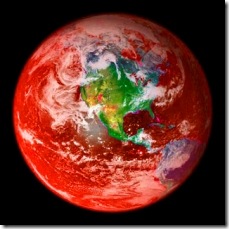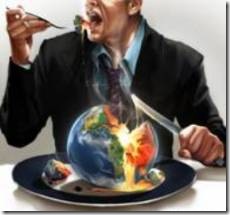I don’t know about you, but this year’s Earth Day leaves me bereft, feeling somewhat frustrated and depressed that I am not doing enough and that we, collectively, are still in denial about the human impact on climate change and resultant planet degradation. Those of us not still in denial who live in the so-called “developed” countries appear to be apathetically slow to make meaningful ecological choices, and we are too easily influenced by “pseudo-greening” or “green-washing” that is meant to deceive the actual reality of continuing to practice a destructive status quo. Based on evidence, it appears that we continue to create problems, not solve them, in spite of all those good intentions we project (or lie about, in some cases). Let’s look at a few facts that confront us.
frustrated and depressed that I am not doing enough and that we, collectively, are still in denial about the human impact on climate change and resultant planet degradation. Those of us not still in denial who live in the so-called “developed” countries appear to be apathetically slow to make meaningful ecological choices, and we are too easily influenced by “pseudo-greening” or “green-washing” that is meant to deceive the actual reality of continuing to practice a destructive status quo. Based on evidence, it appears that we continue to create problems, not solve them, in spite of all those good intentions we project (or lie about, in some cases). Let’s look at a few facts that confront us.
According to IPCC, farmers who practice rain-fed agriculture could see a 50 percent reduction in yield in the coming decade. This has led to coining the term, “food insecurity”, which itself seems too gentle a term for the reality of mass starvation. Rain-fed agriculture is a major source of food and fiber. About 60% of world staple food production relies on rain-fed agriculture. Rainfall is also responsible for meat production through grazing and for wood from the forest. In Tanzania and other Sub-Saharan African countries where irrigation is very limited, almost all food and most cash crops such as cotton, tobacco and wood depend on rainfall (Rockström, 2000). It is a fact that the talks at Copenhagen failed miserably and that the powerful shut out the voices of the not-so-powerful. The rich technocrats (Bill Gates, Richard Branson, etc.) would have us believe that climate engineering is a simple solution to solve the problem, in spite of the many reluctant scientists and engineers who cautiously report in any one of the 209,000 papers found here on the Google.
These statistics alone should be alarming enough to spur us to action for a reversal of harmful practices like CO2 emissions, but layers of other negative influences complicate our possible actions. Influences that many of us feel powerless to stop.
 The concept of (self regulated) corporate social responsibility that emerged in the 70’s, with no actual watchdog over emerging multi-national corporations is widely debated, with proponents advocating that corporations benefit in multiple ways by operating with a perspective broader and longer than their own immediate, short-term profits. Critics argue that CSR distracts from the fundamental economic role of businesses; others argue that it is nothing more than superficial window-dressing; others yet argue that it is an attempt to pre-empt the role of governments as a watchdog over powerful multinational corporations (Wikipedia). The Organization for Economic Cooperation and Development’s (OCED) Guidelines for Multinational Enterprises are the only corporate responsibility instrument formally adopted by state governments. This critical analysis from 2008 gives us more detail about the limitations of developing countries to monitor or regulate foreign corporations, and there has been little conclusive evidence that these corporate investments do promote growth and employment in developing countries. Human rights are neglected or abused, ecosystems are disrupted, completely wiping out indigenous people’s livelihood in some instances.
The concept of (self regulated) corporate social responsibility that emerged in the 70’s, with no actual watchdog over emerging multi-national corporations is widely debated, with proponents advocating that corporations benefit in multiple ways by operating with a perspective broader and longer than their own immediate, short-term profits. Critics argue that CSR distracts from the fundamental economic role of businesses; others argue that it is nothing more than superficial window-dressing; others yet argue that it is an attempt to pre-empt the role of governments as a watchdog over powerful multinational corporations (Wikipedia). The Organization for Economic Cooperation and Development’s (OCED) Guidelines for Multinational Enterprises are the only corporate responsibility instrument formally adopted by state governments. This critical analysis from 2008 gives us more detail about the limitations of developing countries to monitor or regulate foreign corporations, and there has been little conclusive evidence that these corporate investments do promote growth and employment in developing countries. Human rights are neglected or abused, ecosystems are disrupted, completely wiping out indigenous people’s livelihood in some instances.
This week, Senators John Kerry, Joseph Lieberman and Lindsey Graham plan to introduce a climate bill that will eliminate the EPA’s authority under the Clean Air Act to regulate greenhouse gas emissions. “First of all, one of the conditions of the bill we’re hearing is that it will eliminate the EPA authority under the Clean Air Act to regulate greenhouse gas emissions, which is a slap in the face to everything that Earth Day stands for . . . Secondly, it will include cap-and-trade provisions between utilities, so you could have a nuclear power company trading with a coal power company, but if it’s too expensive for them to meet their emissions targets, they could buy offsets . . . and, unanimously, all of the statements that are coming out of the different working groups here at the Bolivian Climate Conference are condemning carbon markets.”, Activist Daphne Wysham, a fellow at the Institute for Policy Studies in Washington, DC, and co-director of the Sustainable Energy and Economy Network reported today.
The interconnected complexity of all this seems overwhelming. Can I, and others like me,  revive and cultivate optimism and actually take meaningful action, especially when our government and major corporations seem to be dragging their feet or acting against our greater interests in this regard? In spite of the powerful country-corporate refusal to listen, there are thoughts and ideas coming out of Bolivia this week for us to contemplate.
revive and cultivate optimism and actually take meaningful action, especially when our government and major corporations seem to be dragging their feet or acting against our greater interests in this regard? In spite of the powerful country-corporate refusal to listen, there are thoughts and ideas coming out of Bolivia this week for us to contemplate.
A key initiative to come out of the Bolivia Climate Conference is a Universal Declaration of the Rights of Mother Earth. The key points here encourage me and hopeful that after this long discourse intended to move you to gather more information to support alternative solutions, you still have the time and inclination to contemplate them yourself. You can sneak a peek at these guys if you want to get involved and make an environmental change.
Happy Earth Day,
Marcia
P.S. I have to give great thanks to Amy Goodman and Democracy Now, who I share my breakfast with every weekday morning for at least a decade now. I also weep with sadness for us all that the great Bill Moyers Journal, another great source for my social, environmental and economic chops, will be leaving PBS. I am encouraged to know that Bill Moyers Blog will continue to be carried online by PBS, at least for now. Nobody is saying the reasons for his retirement out loud, but I suspect the more conservative Board at PBS is a factor, especially when we see no progressive replacement.